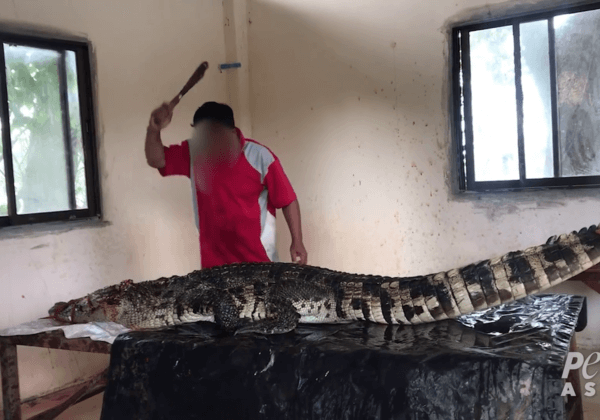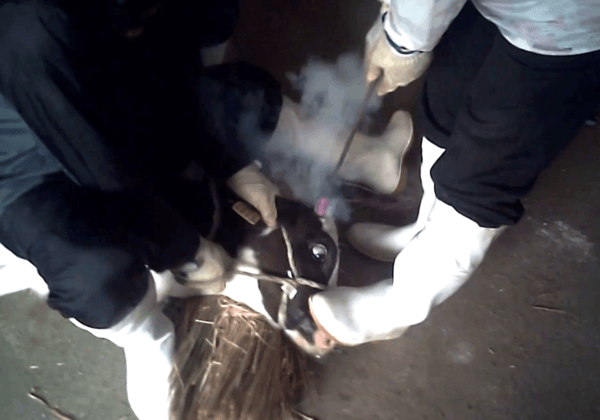Yet Another Whale Dies From Ingesting Plastic Bags—This Time in the Philippines
A dead juvenile male Cuvier’s beaked whale who washed up on the shores of the Philippines was found with 40 kilograms of plastic waste in his stomach. The animal had died from “gastric shock” after ingesting so much plastic.
Marine biologists from the D’Bone Collector Museum in Davao City in the Philippines found that the whale had ingested 16 rice sacks, four banana plantation bags, and several single-use plastic shopping bags. Over the last decade, these marine biologists have recovered 57 whales and dolphins who have died after ingesting plastic, fishing nets, or other trash and pollution in the ocean.
According to the Ocean Conservancy, China, Indonesia, the Philippines, Thailand, and Vietnam have been dumping more plastic into the ocean than the rest of the world combined.
Last year, a whale near Thailand was found dead after ingesting more than 80 plastic bags and other pieces of plastic waste, weighing nearly 8 kilograms. Another whale near Indonesia died after consuming nearly 13 pounds of plastic waste, including two flip-flops, four plastic bottles, 25 bags, and 115 cups.
Littering Hurts All Animals—Not Just the Ones on Land
Sadly, this whale’s story isn’t unique or even uncommon. Whales all over the world have been discovered with plastic garbage in their stomachs. Scientists also have evidence that more than half of all sea turtles around the world have ingested plastic.
You can start making a difference right away by:
- Taking reusable shopping bags with you every time you head to the store
- Never littering
- Rinsing out cans and putting the tops inside so that they won’t cut an animal’s tongue, then crushing the top so no animal can get their nose stuck inside
- Crushing soda cans
- Fully breaking apart plastic six-pack rings
- Cutting open empty cardboard and plastic containers so that small animals can’t get their faces or heads trapped inside them
- Going vegan
It’s not just single-use plastic that’s causing havoc in our oceans. Abandoned fishing gear is killing and mutilating millions of sea animals every year, too. Scientists estimate that 46 percent of the mass of the Great Pacific Garbage Patch comes from fishing nets. And other types of fishing gear account for much of the remaining weight.
It’s simple: Less fishing means less fishing gear—abandoned or otherwise.
You Can’t Eat Fish and Call Yourself an Environmentalist
Today’s commercial fishers use enormous nets called trawlers along with electronic equipment and satellite communications to track fish. These huge nets, sometimes miles long, stretch across the ocean, swallowing up everything and everyone—including turtles, seabirds, and dolphins—in their path. “Nontarget” animals like these make up 40 percent of the total global fish catch, and the nets further devastate delicate ecosystems already in danger from the effects of climate change.
Ghost fishing gear takes a growing global toll on ocean wildlife: https://t.co/sYm5GaoNko @PNS_News @GGGInitiative pic.twitter.com/FKgJhFfxzP
— Ken Peterson (@aquaken) March 22, 2018
Smithsonian magazine reported that between 10 and 100 billion farmed fish are killed globally every year and that another 1 to 3 trillion fish are caught in the wild. According to the Food and Agriculture Organization of the United Nations, 35 percent of fish caught in the ocean never even make it to a plate.
Today, the number of fish killed in a given year exceeds the total number of humans who have ever existed.
Every tiny step is a good one BUT — plastic straws account for 0.03% of all plastic in the ocean ? Discarded fishing nets account for at least 46% of the plastic in the garbage patch & other fishing gear make up a big portion of the remaining 54% ?? #StopEatingFish pic.twitter.com/IlR6MUlEiJ
— PETA Asia (@PETAAsia) March 15, 2019
If we really want to help save these animals and prevent further suffering, we need to practice environmentally friendly behavior every single day. That means refusing to support the fishing industry, which is horrifically cruel to animals and devastating to the environment.
Help Fish—Pledge to Go Vegan Today







